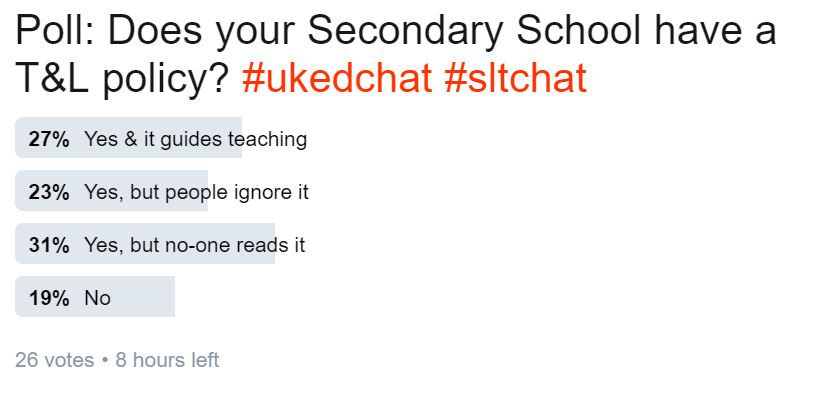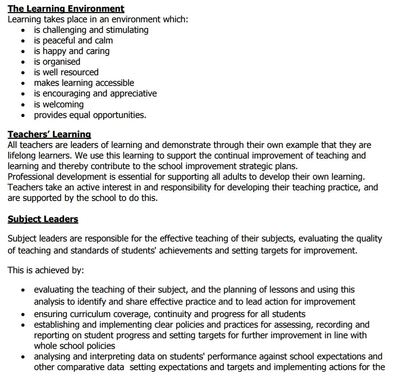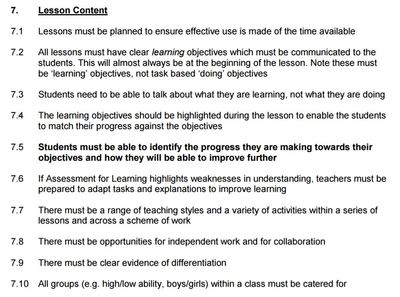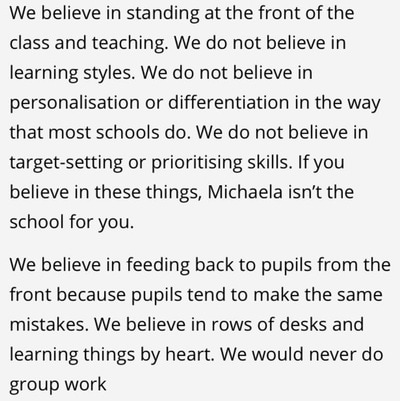Summer is a great time to review T&L policies for next year. Good way to reflect strategic priorities. Really like these #ukedchat #SLTchat pic.twitter.com/AOv7t2qZ2q
— Alex Ford (@apf102) June 26, 2017
Really? To me just sounds...bleugh. Bland, generic, empty platitudes. The sort of policy teachers read, forget, and get on with job.
— Michael Fordham (@mfordhamhistory) June 27, 2017
Reading stuff like this makes me dislike teaching. Luckily I ignore it and just teach, reminding me why I am a teacher.
— Figgimus Maximus (@pthefigg) June 27, 2017
No one really needs these policies. God knows why folk write em
— David Didau (@DavidDidau) June 27, 2017
1) What should a good T&L policy do if it is going to be followed?
2) Why do we create T&L policies if nobody looks at them?
3) Should schools be criticised if they set T&L policies but then don't enforce them or follow them up?
I am going to endeavour to offer my own embryonic thoughts, but I am very interested in what others think of this.
What should a T&L policy do?
There is a semantic question here about whether or not policies need to be enforceable. I had an interesting discussion to this end with Michael Fordham. For my part, I think having a broad set of principles which guides the teaching and learning in a school is no bad thing, as long as those principles allow enough latitude for teachers to teach their subject using appropriate pegadogies. Good T&L policies for me do not stipulate whether group work is allowed or not, or that iPads must be used in all lessons - this I fear is counterproductive. By and large, I think the policy extracts below achieve this (if they are adhered to)
What if reducing professional freedoms means being more effective?
— Toby French (@MrHistoire) June 27, 2017
Why create T&L policies?
The real question of course is why so many schools seem to spend time creating policies which nobody then reads, or which do not actually guide what happens. It is very interesting that so many T&L policies have exactly the same content, and even phrasing, suggesting that many simply adapt a pre-existing policy for their school. I am genuinely interested in why people think this is. My only thought so far is that there must be some Ofsted demand, or people just love writing policy documents. But even then, what does it say about a school if they have a policy which nobody follows? This brings me neatly on to my next point...
Should schools be criticised for having policies they do not follow?
As ever, this is more nuanced than it first appears. Clearly all policies undergo review and modification over time. However, if a school creates a policy (whether good or bad) with no thought or intention of enforcing it, then it begs questions about appropriate use of time, and raises even bigger questions about which other policies are there just for show. Given the documentary focus of Ofsted, surely it is important for schools to be seen to be promoting the policies they share with staff, students and parents?
This brings me back to the point that good T&L policies should therefore be broad enough to allow for subject specific pedagogical breadth, and rooted clearly in educational aims which all staff, students, and parents can agree to and support. Anything else seems like a bit of a waste of time...
I would be very interested in people's thoughts on this. Please do share your own T&L policies. Comments welcome via the form below or Twitter @apf102 or @andallthatweb
* First policy sets taken from HERE and HERE; second sets come from HERE and HERE








 RSS Feed
RSS Feed
